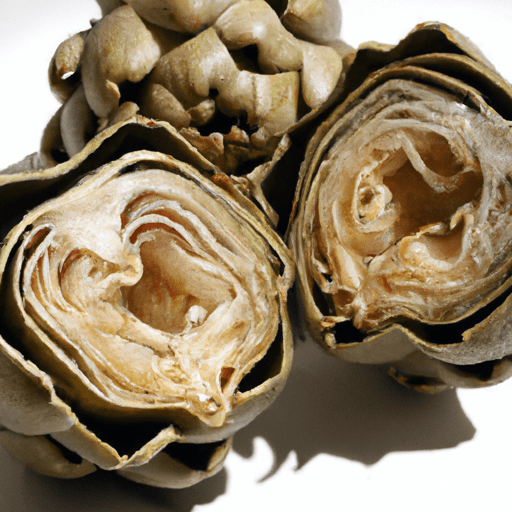Exploring the Delights of Frozen Artichoke Hearts
Artichokes are a culinary treasure loved by food enthusiasts around the world, and frozen artichoke hearts offer a convenient way to enjoy their unique flavors all year round. These little pockets of goodness are a versatile ingredient that can add depth and complexity to a wide range of dishes. Join us on a journey as we unravel the secrets of frozen artichoke hearts, exploring their taste, uses in cooking, nutritional value, and uncovering some fascinating history and facts.
Taste and Texture
Frozen artichoke hearts have a distinct earthy and slightly sweet taste, with a hint of nuttiness. They offer a delightful combination of flavors that intensify when cooked. The tender and buttery texture of the hearts adds a pleasant mouthfeel to any dish they grace.
Common Uses in Cooking
Soups, Stews, and Casseroles
Frozen artichoke hearts are excellent additions to soups, stews, and casseroles. Their robust flavor pairs well with hearty ingredients like chicken, lamb, or beans. They hold up well during cooking, maintaining their shape and texture, while infusing the dish with their delightful taste.
Salads and Grain Bowls
For those seeking to incorporate more vegetables into their meals, frozen artichoke hearts are a fantastic choice for salads and grain bowls. Simply thaw them and toss them into your favorite greens or grain base. Alternatively, a quick sauté can enhance their flavor, making them an excellent topping for your creations.
Pasta and Risotto
Artichokes and pasta are a match made in culinary heaven. Combine thawed or sautéed frozen artichoke hearts with pasta or risotto for a wholesome and satisfying meal. Tossed with some olive oil, garlic, and fresh herbs, they create a simple yet elegant dish bursting with flavors.
Dips and Spreads
Artichoke hearts are the star ingredient in one of the most beloved party appetizers - artichoke dip. Melded with cheese, herbs, and spices, this creamy indulgence never fails to satisfy. Frozen artichoke hearts work perfectly for this purpose, saving you time while still delivering exceptional taste.
Nutritional Value
Beyond their culinary attributes, frozen artichoke hearts also come packed with numerous nutritional benefits. They are low in calories and fat, making them an excellent choice for those who aim to maintain a healthy diet. Artichokes are also a rich source of dietary fiber, vitamin C, vitamin K, potassium, and antioxidants. These nutrients contribute to overall well-being and promote good digestive health.
Artichokes Through History
Artichokes have a fascinating history dating back to ancient times. Originating from the Mediterranean region, they were highly regarded by the Greeks and Romans for their medicinal properties. Ancient Greeks believed that consuming artichokes could improve digestion and liver function. In the 16th century, Catherine de Medici, a prominent Italian noblewoman who became the Queen of France, introduced artichokes to the French court, bringing them into popular culinary culture.
Fun Facts about Artichoke Hearts
- Did you know that artichokes are actually flowers? The part we eat is the immature flower bud, which is harvested before it blooms.
- The largest producer of artichokes in the world is currently Italy, followed closely by the United States. This vegetable has found its way into the hearts of people worldwide!
- Artichokes are considered aphrodisiacs in many cultures, particularly in ancient Rome.
- Jerusalem artichokes have no relation to regular artichokes. They are actually a type of sunflower native to North America.
Next time you’re perusing the freezer aisle, don’t overlook the humble bag of frozen artichoke hearts. With their enticing taste, versatility in cooking, and impressive nutritional profile, these little gems are a valuable addition to any kitchen. So why not let your creative culinary instincts take flight and start experimenting with frozen artichoke hearts today? You won’t be disappointed!
Frozen Artichoke Hearts
Origin and Common Uses:
- Artichokes, the vegetable from which artichoke hearts are derived, have been cultivated for centuries and are believed to originate from the Mediterranean region. Today, they are cultivated in various parts of the world, including Europe, the United States, and North Africa.
- The artichoke heart is the tender, fleshy part of the artichoke that is found at the base of the edible leaves. Frozen artichoke hearts, which are usually pre-cooked and then frozen, are a convenient option for cooks looking to save time and effort in preparing artichokes.
- Frozen artichoke hearts can be used in a variety of dishes including dips, salads, pasta, pizza, risotto, and Mediterranean-style recipes. They can also be added as a topping to bruschetta or mixed into casseroles and stews.
Nutritional Benefits:
- Artichokes, including artichoke hearts, are a good source of fiber, vitamins, and minerals. They are particularly rich in dietary fiber, vitamin C, vitamin K, folate, and potassium.
- Artichoke hearts are low in calories and fat, making them a healthy addition to a balanced diet. They also contain antioxidants, which help to protect the body against oxidative stress and may play a role in reducing the risk of chronic diseases.
Unique Properties and Historical Significance:
- Artichokes have a unique flavor that is often described as nutty and slightly sweet, with a hint of bitterness. This distinctive taste makes them a delicious addition to many dishes.
- In ancient times, artichokes were highly regarded for their medicinal properties. They were believed to aid digestion, improve liver function, and even act as an aphrodisiac.
- The artichoke became particularly popular during the Renaissance period in Europe, and it was considered a delicacy enjoyed by nobility. Today, artichokes and their hearts continue to be enjoyed around the world for their flavor and nutritional benefits.




Use the share button below if you liked it.
It makes me smile, when I see it.